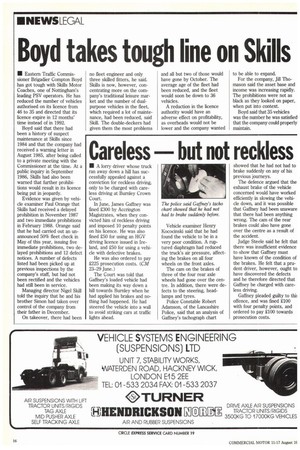Boyd takes tough line on Skills
Page 14

If you've noticed an error in this article please click here to report it so we can fix it.
• Eastern Traffic Commissioner Brigadier Compton Boyd has got tough with Skills Motor Coaches, one of Nottingham's leading PSV operators. He has reduced the number of vehicles authorised on its licence from 46 to 35 and directed that its licence expire in 12 months' time instead of in 1992.
Boyd said that there had been a history of suspect maintenance at Skills since 1984 and that the company had received a warning letter in August 1985, after being called to a private meeting with the Commissioner at the time. At a public inquiry in September 1986, Skills had also been warned that further prohibitions would result in its licence being put in jeopardy.
Evidence was given by vehicle examiner Paul Orange that Skills had received a delayed prohibition in November 1987 and two immediate prohibitions in February 1988. Orange said that he had carried out an unannounced 50% fleet check in May of this year, issuing five immediate prohibitions, two delayed prohibitions and 12 defect notices. A number of defects listed had been picked up at previous inspections by the company's staff, but had not been rectified and the vehicles had still been in service.
Managing director Nigel Skill told the inquiry that he and his brother Simon had taken over control of the company from their father in December.
On takeover, there had been no fleet engineer and only three skilled fitters, he said. Skills is now, however, concentrating more on the company's traditional leisure market and the number of dualpurpose vehicles in the fleet, which required a lot of maintenance, had been reduced, said Skill. The double-deckers had given them the most problems and all but two of those would have gone by October. The average age of the fleet had been reduced, and the fleet would soon be down to 36 vehicles.
A reduction in the licence authority would have an adverse effect on profitability, as overheads would not be lower and the company wanted to be able to expand.
For the company, Jill Thomason said the asset base and income was increasing rapidly. The prohibitions were not as black as they looked on paper, when put into context.
Boyd said that 35 vehicles was the number he was satisfied that the company could properly maintain.












































